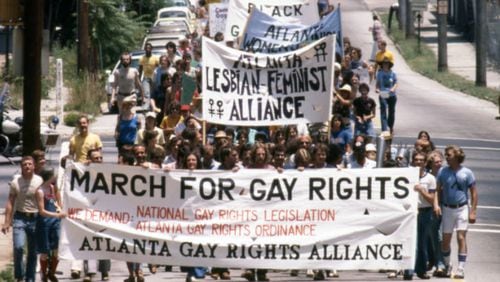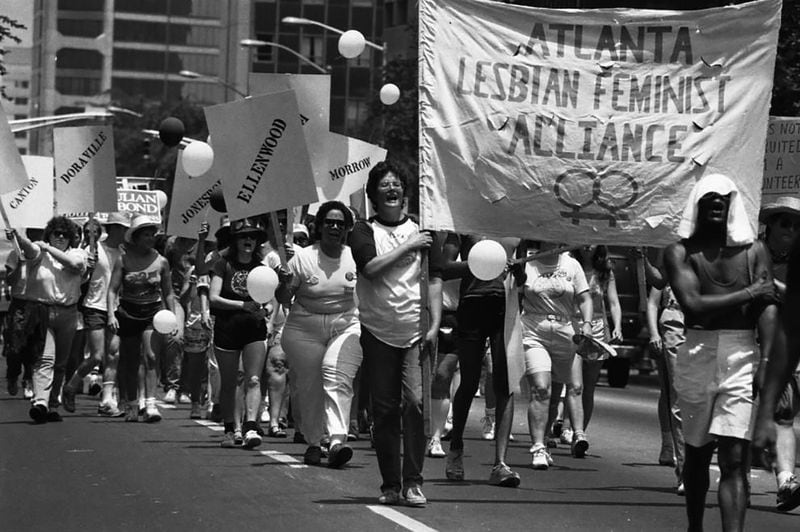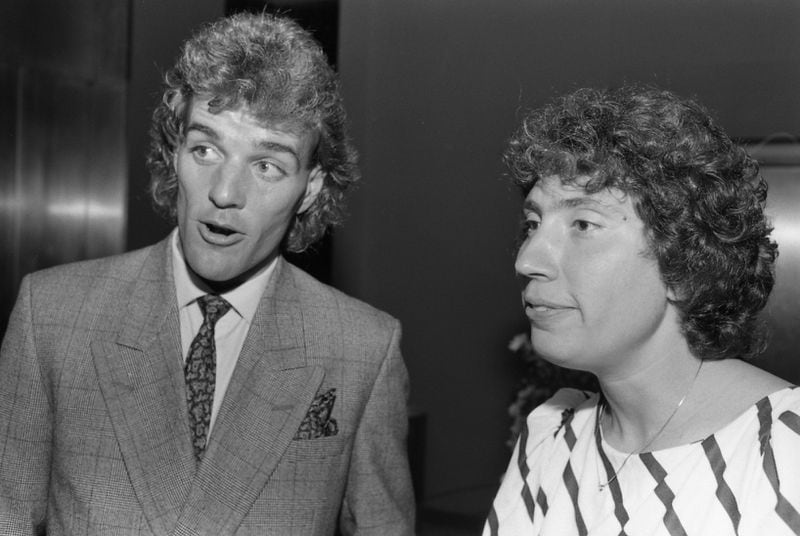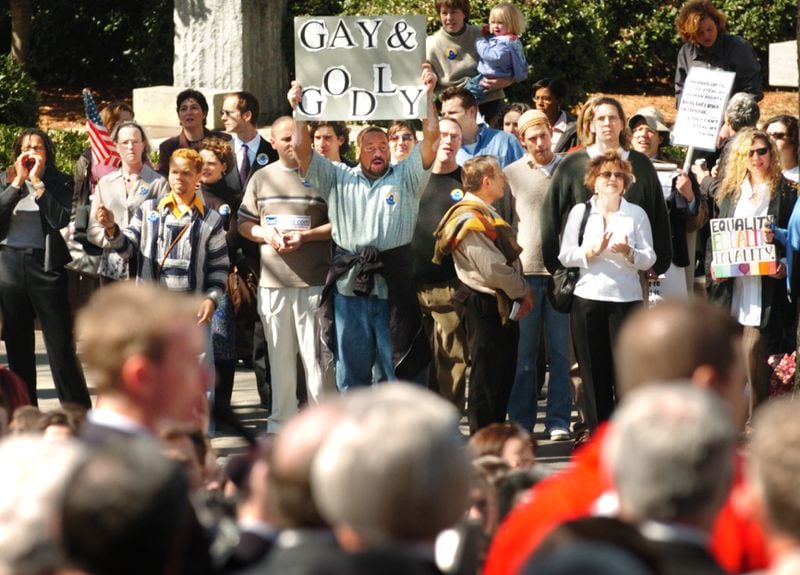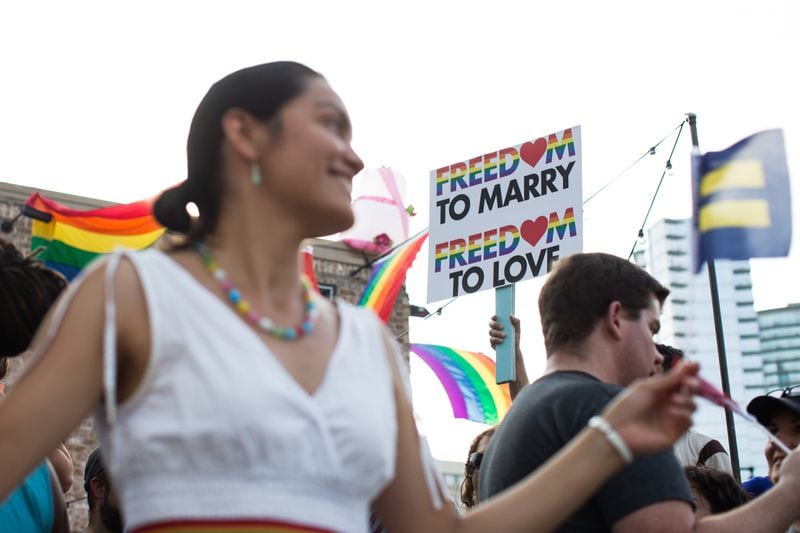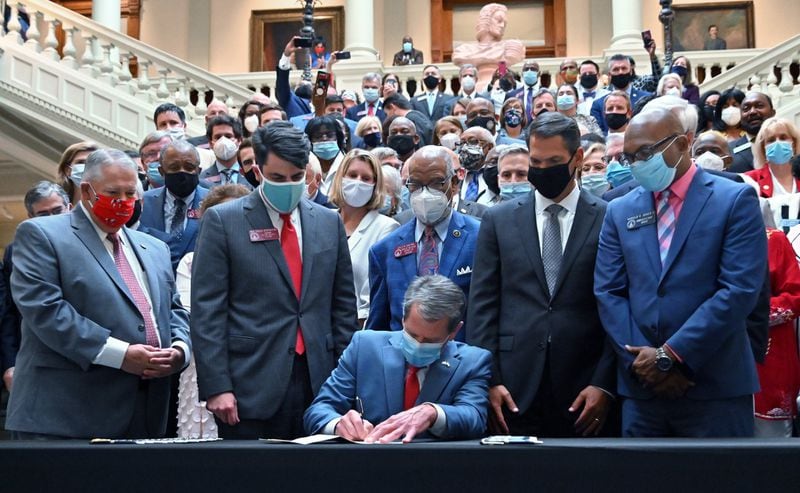June 27, 2021 marks the 50th anniversary of Atlanta’s first gay pride march. Here’s a look back at some key moments that shaped the city’s LGBTQ community over the last five decades.
August 1969 – Atlanta police raid the Ansley Mall Mini Cinema in Midtown during a showing of Andy Warhol’s “Lonesome Cowboys,” a western satire that features gay sex scenes. Cops arrested the theater manager and photographed members of the audience to identify anyone with “records for previous sex offenses.” The raid, together with New York City’s Stonewall riots six weeks earlier, is the catalyst for Atlanta’s gay rights movement.
June 1971 – More than 100 activists assemble in Midtown for Atlanta’s first gay pride march to mark the two-year anniversary of Stonewall. Led by members of the Georgia Gay Liberation Front, which formed in response to the Ansley raid and other police harassment, participants push for an end to sodomy laws and discrimination in the workplace, housing and other programs.
June 1972 – A group of lesbian activists form the Atlanta Lesbian Feminist Alliance, a group that would become a powerful force in the city’s LGBTQ community for years.
June 1976 – Mayor Maynard Jackson issues Atlanta’s first “Gay Pride Day” proclamation. The move, opposed by religious conservatives, results in a lawsuit and calls for Jackson’s resignation. The next year he names the same day “Human Rights Day.”
June 1978 – An appearance by Anita Bryant, the singer and activist who opposed gay rights, at the Southern Baptist Convention attracts several thousand protesters to Atlanta’s World Congress Center and reinvigorates the city’s LGBTQ liberation movement.
1982- AID Atlanta, an agency that provides HIV/AIDS-related services and education, opens. Three years later, the city would hold its first community memorial service for people who have died from the epidemic.
June 1986 – In a 5-4 decision, the U.S. Supreme Court rules that Georgia’s sodomy law is constitutional as it relates to gay couples. The case was brought by Atlanta bartender Michael Hardwick, who was arrested on sodomy charges after law enforcement entered his residence to serve him an arrest warrant on an unrelated offense and found him in bed with a man. In his concurring opinion, then-Chief Justice Warren Burger wrote that “to hold that the act of homosexual sodomy is somehow protected as a fundamental right would be to cast aside millennia of moral teaching.”
Credit: The Atlanta Journal-Constitution
Credit: The Atlanta Journal-Constitution
August 1993 – Cobb County adopts a resolution calling homosexuality “incompatible with the standards to which this community subscribes.” The move was in part a reaction to the staging of the play “Lips Together, Teeth Apart,” which has gay references, in Marietta Square. Less than a year later, under pressure from gay rights advocates, the Atlanta Committee for the Olympic Games announced it was pulling volleyball games out of Cobb County in response to the resolution.
August 1996 – A gathering of Black LGBTQ friends in Piedmont Park sparks what eventually becomes Atlanta Black Pride, an annual Labor Day weekend festival that now draws upwards of 10,000 people to the city for arts, cultural and educational events.
November 1998 – Georgia’s Supreme Court strikes down the state’s 165-year-old sodomy law. Five years later, the U.S. Supreme Court overturns its decision in the Hardwick case.
December 2000 – Atlanta becomes the first city in Georgia to adopt an ordinance barring business owners from discriminating on the basis of sexual orientation, gender identity and other factors. Nearly two decades later, other metro Atlanta municipalities — including Doraville, Chamblee and Clarkston — begin following suit.
November 2004 – More than 76% of Georgia voters approve an amendment to the state constitution banning same-sex marriage. The action came the same year that Massachusetts became the first state in the country to legalize gay marriage.
Credit: AJC file
Credit: AJC file
September 2009 – Two dozen Atlanta police officers raid the Midtown gay bar the Atlanta Eagle, ordering customers to the floor while using anti-gay slurs. Officers, who said they were acting on reports of men engaging in sex, arrest eight people, but those charges are soon dropped or dismissed. Six officers are later fired and nine others disciplined in response to a report that found that many lied, knowingly violated the constitutional rights of those at the bar, destroyed evidence and tried to cover up what they had done.
2014 – Activists launch Southern Fried Queer Pride, which focuses on empowering queer and trans people of color through the arts.
June 2015 – Gay marriage is legalized for the first time in Georgia after the Supreme Court rules that the Constitution’s equal protection and due process clauses protect same-sex couples.
Credit: George Mathis
Credit: George Mathis
March 2016 – Then-Gov. Nathan Deal vetoes House Bill 757, a “religious liberty” measure that would have allowed faith-based organizations to deny services to those who violate their “sincerely held religious beliefs.” Gay rights and business groups loudly opposed the measure, which they said was discriminatory. Deal said the measure, which was backed by religious conservatives and the Republican-controlled Legislature, did not reflect Georgia’s welcoming image.
June 2020 – The Supreme Court, in a 6-3 decision, rules that employers cannot fire LGBTQ workers because of their sexual orientation or gender identity. The decision comes in response to a case brought by a Doraville man who argued he was fired from his job with Clayton County because he is gay.
June 2020 – In the aftermath of the shooting death of Ahmaud Arbery, Gov. Brian Kemp signs a hate crimes bill into law. The measure allows enhanced criminal penalties to be levied against those who target their victims on the basis of race, gender, sexual orientation and other factors. It marks the first time the state of Georgia approved protections for the state’s LGBTQ population.
Sources: AJC archives; Atlanta History Center and Auburn Avenue Research Library exhibit “Atlanta Since Stonewall” by Wesley Chenault
